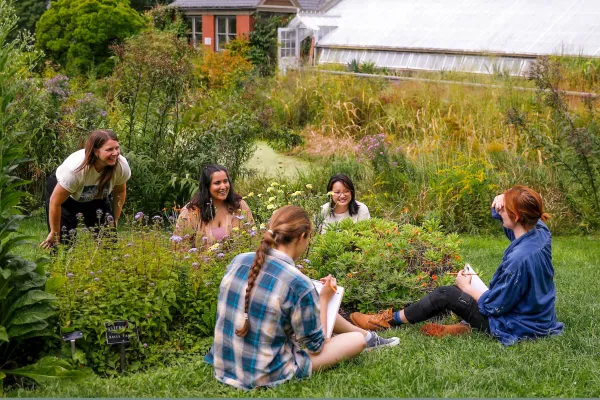Learning and Engagement Plan Guides Educational Approach and Focus for the Botanic Garden

Published June 4, 2023
Leaflet 2023
The Botanic Garden of Smith College announces the publication of its very first Learning and Engagement Plan (LEP). The LEP is anchored in the botanic garden’s larger strategic plan, 125 Years in the Making: 2019-2024 Strategic Plan, as well as within the mission of Smith College, which links the power of the liberal arts to excellence in research and scholarship, thereby developing engaged global citizens and leaders to address society’s challenges.
The LEP defines our vision for teaching and learning at the botanic garden, shares the approaches and strategies we will use to realize that vision, and outlines topics—Science, Culture and Place—and accompanying themes that our educational programming and interpretation will focus on in years to come.
Science—Teaching the building blocks of plant science is core to our educational identity and history. By anchoring our educational opportunities in the sciences, we can help students more fully explore, communicate about and appreciate the botanical world. By studying basic biology and ecology, stakeholders begin to understand the key role plants play in sustaining all life, and can begin to proactively apply these concepts in support of real-world problem solving.
Culture—Throughout history, humans have used plants to sustain themselves physically and spiritually. This essential relationship with plants is central to our success as a species and our collective identity as people. Plants have impacted the development of cultures, just as humans have impacted plants. The immense and significant value of plants to human life and their value to human culture has been the motivating factor behind both inspired progress and terrible violence and conquest. Our collection presents an important opportunity to explore the complex histories and multifaceted stories at the intersection of people and plants.
Place—The Botanic Garden of Smith College is rooted in the liberal arts and is a foundation of the Smith experience. Founded on the premise that the scientific study of plants and their ornamental value could complement one another on a college campus, the Smith landscape and botanical holdings have inspired countless students, faculty and visitors. Today, we work with courses across the curriculum to make connections between botanical study and the liberal arts, and advocate for botanic garden’s use and enhancement as a learning resource. As stewards of the Smith landscape, we bear a responsibility to work with stakeholders to ensure it is a reflection of current values. We play a role in sharing its history and stewarding it ethically and intentionally from both an ecological and a culturally inclusive perspective.
The LEP is also a reflection of the botanic garden’s mission to foster environmental and social justice through teaching and learning about plants, people and place. The vision, approaches, strategies and topics enumerated in the LEP have been carefully crafted to best serve this mission. The stories we choose to tell, the topics we explore, and the ways we prepare to welcome and celebrate learners from diverse backgrounds and all experiences matter. By aligning our educational initiatives with our mission we will better help learners expand the ways they understand the botanical world and their place in it.